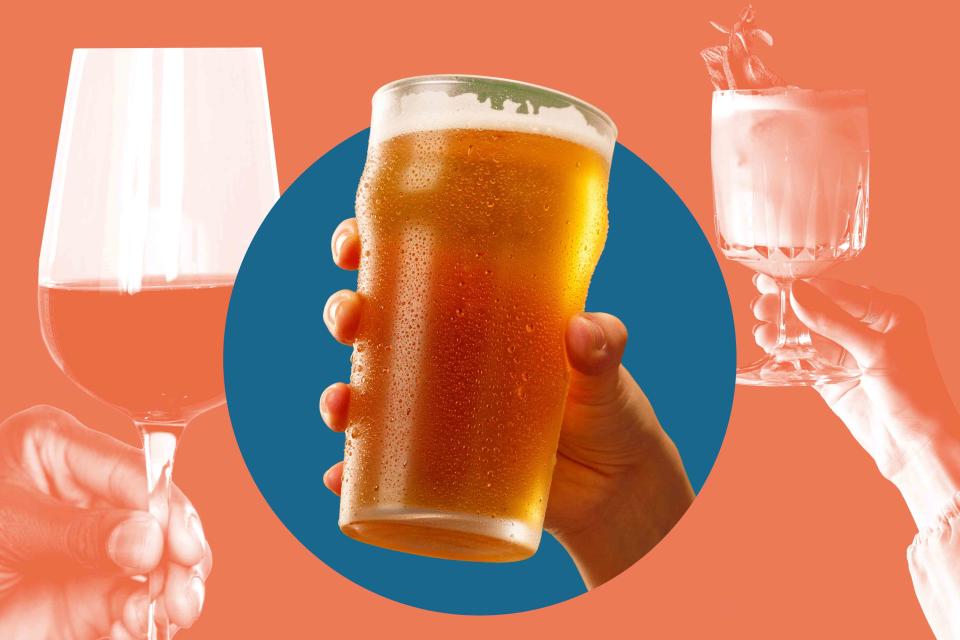Scientists in Zürich Invent an Edible Gel That Reduces the Effects of Alcohol
But there's a catch.

Food & Wine / Getty Images
Late Stone Age jugs tell us that a form of “beer,” loosely defined as represented by residues of fermentation, has been with us for 10,000 years. And the earliest evidence of wine production is 6,000 years old — so we’ve had a little time to grapple with alcohol and its bodily effects.
More precisely, we’ve had several thousand years in which alcohol in its many fine forms has always gotten the better of us. Humans are, by definition, really, really good at getting drunk.
Understanding the chemistry of that metabolic transaction – the immediate absorption of the alcohol from the gastrointestinal tract directly into the bloodstream – led scientists from the Eidgenössische Technische Hochschule Zürich, or the Swiss Federal Technical University in Zürich, to explore methods for diverting or at least mitigating the metabolization process from the bloodstream and the liver, which is the path that alcohol blazes through our bodies as we drink.
Related: Why It's Illegal to Get Drunk in an English Pub
In short, they created an edible gel by cooking whey protein for a few hours — whey being familiar to athletes as the protein powder out of which they make breakfast shakes — and lacing those long fibrous strands of the cooked protein with iron and gold molecules. Sounds delicious, right?
The question for serious drinkers of alcohol might be, How is this newfangled gel different from just going to Salt Bae’s overpriced restaurant in Dubai and eating a couple of his thousand-dollar 24-carat gold-wrapped steaks? His prices may be criminally high, but Salt Bae does purvey gold, protein, and iron in his own way, no?
Turns out the gel is a lot different from that. It’s useful to recall that ETH Zürich is, annually, high among the top ten universities in the world, producing Nobel laureates literally by the dozen — some 32 Nobel winners have either taught or studied there. One of its better-known alumni is the modest Swiss mathematics and natural sciences graduate, who attended ETH between 1896 and 1900 and who later taught physics there between 1912-1914, Albert Einstein. Just to say, when ETH professors and students do something, it usually has staying power.
It gets better: The ETH’s Laboratory for Food and Soft Materials, whose professors and student scientists are the authors of the recently published study, had the brilliant idea with their highly nano-engineered gel to relocate the body’s metabolization of alcohol from the liver to the digestive tract. Put simply, if consumed, the gel would jump-start the alcohol’s metabolization in the gut, before it even got to the bloodstream and started to wreak its age-old havoc inside us. In a sense, the gel can be understood as the Copernican revolution
Related: Couples Who Drink Together Live Longer, Study Suggests
To test their hypothesis, they got a bunch of mice drunk and fed them the gel. Going in, it was clear that the introduction of the gel (to the mice’s digestive tracts) had to happen rather quickly, while the alcohol was still held there, because the gel can’t get into the bloodstream and retroactively arrest the alcohol as it is en route to processing by the body. By then it’s too late.
But in the GI tract, the magic did work.
Introduced in time alongside the alcohol, the mice in the test group exhibited radically-lowered alcohol levels — 40% to 50% lower than the control group, whose livers were tasked with the job of metabolizing the poison. The test group also demonstrated less body damage generally.
Human trials remain on the horizon, but, significantly, and boding for much more fun down the road, the ETH team has applied for a patent on the gel. Could it be the silver bullet to alcohol consumption?
Related: How to Navigate the Brunch Drink Menu Like a Pro
Though the numbers are impressive, the truth is: All good things take time. As we know, getting drunk is a process. You have to ingest the gel as or before you drink, not after you drink. And, it doesn’t work in an instant.
Which is to say: Those hard-drinking miscreants looking for a magic get-out-of-jail-free card are at the wrong address with this ETH research. The gel definitely will not save anybody in the event, meaning at their next traffic stop as their friendly neighborhood policeman whips out his Breathalyzer kit.
For more Food & Wine news, make sure to sign up for our newsletter!
Read the original article on Food & Wine.

 Yahoo News
Yahoo News 
